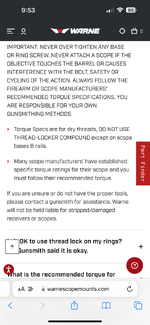Well, yes, but also no. This is sort of what I mean by confirmation bias. You sound like like you have a lot of experience, which is great. I think the trap we all can easily fall into is thinking our own experiences will be universal, and concluding that what has worked for us is likely to be problem-free for others. If theres one thing Ive learned its that nuanced differences that we dont think will be significant sometimes (frequently) create a very different outcome—there’s a LOT of variables when it comes to how different people rattle their stuff loose, or dont. I dont discount your experience at all. However, that leaves me trying to reconcile it with my very different experience—also going on 40 years of tinkering with guns, in which Ive had a pretty consistently different outcome on this topic despite lots of effort to follow manufacturers instructions, use proper equipment, etc. I think it’s likely we are both right for our given situations. My own takeaway is that it’s often really hard to draw conclusions for what someone else will experience based on what I experienced, because SOMETHING is often different-enough to cause a totally different result for others. It leaves me with allowing for the full range of outcomes when someone I dont know asks the question, and offering advice based on covering as many of those outcomes as possible, while causing as little harm as possible. If I thought loctite was going to damage something beyond gumming up a few cents worth of screws, I wouldnt recommend it until that person proves it necessary for their use. But if it doesnt cause a legit PROBLEM, then what’s the harm if the result is good whether your “screws are loose” or not? so it becomes my recommendation as the most-likely to be successful way to mount a scope. Ditto with some other topics that come up here—I like the “highly likely to work for everyone” answer over the “has worked for me” answer. In this case, even if its a lot of mounts, its one person and how that 1 person handles and uses their stuff—essentially 1 data point confirmed multiple times. Whats the answer most likely to work for the full range of data points, ie includes the people for whom that DIDNT work? Its not a contest to say that my experience is better or whatever, it may be tied to usage temperature or something not even tied to recoil or vibration or handling. its simply acknowledging that different outcomes are normal and here’s a way that may be overkill for some people, but is very likely to work for everyone regardless of how they’ll use their gun, and I think thats worthwhile if it cuts down on frustration at the range, on a trip, or at a match.


